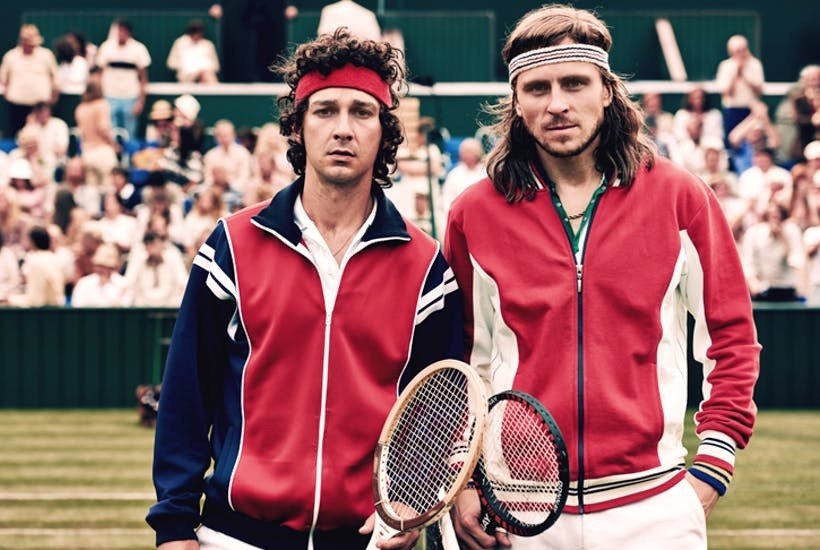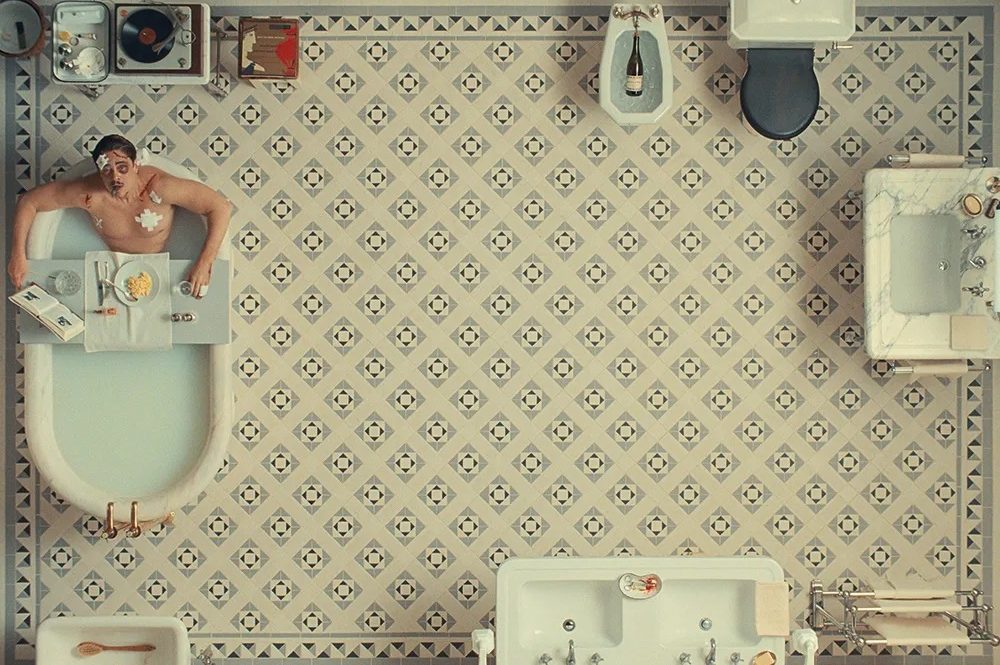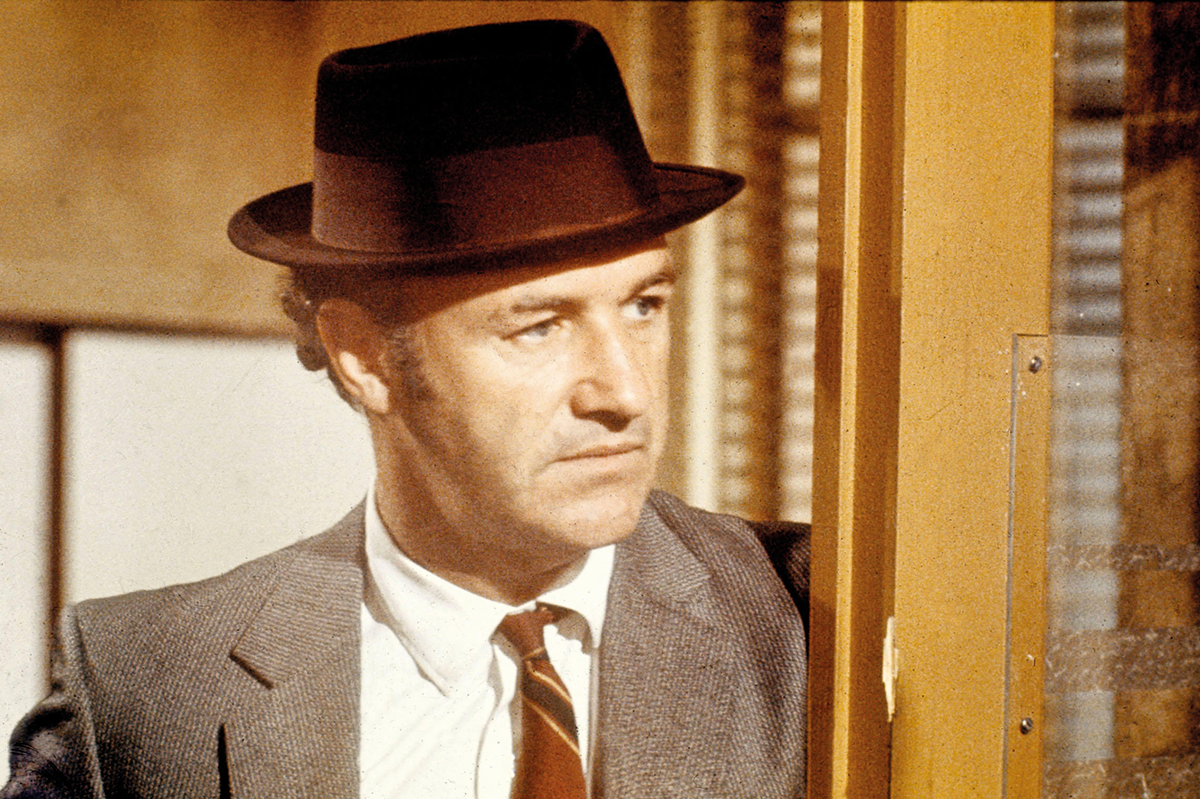Borg vs McEnroe
is a dramatised account of one of the greatest tennis rivalries of all time — between Bjorn Borg and John McEnroe (the clue was always in the title) — that doesn’t hit nearly as hard as it should. It does the job. It gets us from A to B. But it doesn’t dazzle. It doesn’t have the dramatic smarts to lend either surprising tension or excitement to otherwise familiar events, or shed any new light on them. It’s more the pt-pt-pt-pt of a stolid baseline rally and now, you will be thankful to hear, that’s it with the tennis puns. (I only had two anyhow.)
The film stars Sverrir Gudnason as Borg and Shia LaBeouf as McEnroe and it all plays out in the lead-up to their most famous showdown. That is, the 1980 Wimbledon final that ran to five tempestuous sets. For Borg, the cool Swede, a win would mean a record-breaking fifth consecutive title, but only if he could see off this American upstart with the volatile temper, potty mouth and wild, frizzy hair. It also interlaces their back stories although, being a Scandinavian production, it is far more interested in Borg than in McEnroe. The film could quite easily have been called plain Borg. Yet we still don’t get under his skin. Far from it. Mostly, he is allowed to stare deeply into the middle distance like some dishy Scandi-noir detective or, perhaps, a character from a Bergman film. But what is he thinking? We never find out.
Directed by Janus Metz, and written by Ronnie Sandahl, the film initially depicts the players as polar opposites. Borg is shown in his Monaco apartment, staring deeply and dishily out to sea, while McEnroe watches TV footage of himself, remonstrating with a referee, prior to appearing on a TV chat show. ‘You and Borg are as different as two people can be,’ the chat-show host tells him.
Borg is ‘Ice-Borg’. He is unflappable, seemingly emotionless. He spends the night before matches testing the strings on nearly 50 rackets, feeling the tension with his bare feet. Meanwhile, McEnroe (‘Superbrat’) is shown losing his cool every which way. He loses his cool on court, with interviewers, and does not obsessively test his rackets the night before. Instead, he goes clubbing. I think that if the chat-show host hadn’t pointed out that they’re as different as two people can be, we might possibly even have worked it out for ourselves.
Except they aren’t, essentially. That different. The film’s big reversal comes at around the halfway mark when we spool back in time to see that Borg was furiously angry as a youngster, but had been taught to channel it by his trainer, Bergelin (Stellan Skarsgard). ‘All that rage, fear and panic,’ Bergelin tells him. ‘Load it in every stroke.’ The young Borg runs into the forest, screams, hits trees, gets over himself, emerges a new man. (What is this therapy and where can I get some?) But where did all the anger come from initially? There’s some suggestion that he suffered from discrimination as a boy, wasn’t considered the right class for tennis, but this isn’t a sufficient explanation. And as an adult, he had all these weird superstitious rituals — his parents were only allowed to watch him at Wimbledon every second year and had to wear the same clothes; he always had to have the same hire car — which are explained to us in montage but are never interwoven into his psyche.
Meanwhile, McEnroe is so barely coloured-in he’s more of a sideshow. LaBeouf does capture his scrappy volatility, but it’s that, over and over. And Gudnason’s performance is ultimately as shallow because he’s never required to show anything beyond that cool detachment. But what is he thinking, ffs? Nope, still haven’t a clue.
It does make you long for scriptwriter Peter Morgan to have taken it on. He is the master of warring rivalries: Rush, The Damned United, Frost/Nixon, even The Queen, which was, in effect, the Queen vs Tony Blair. He would have given us a dramatic through line, as well as an understanding as to why any of this might matter, plus those smarts — the ones that bring tension and excitement to familiar events. The final match, told in a 20-minute sequence, may or may not be a decent re-enactment —I’m not enough of a tennis nut to know — but because we’ve never properly understood what’s at stake for both players psychologically, there is little at stake for us. Also, the pacing is so workmanlike that it does not feel like any kind of thrilling culmination. It has simply pt-pt-pt-pt-ed its way to here.
This is, in short, a standard sports biopic which, like I said, does the job. But it certainly does not ace it. (Look! I had a third!)

























